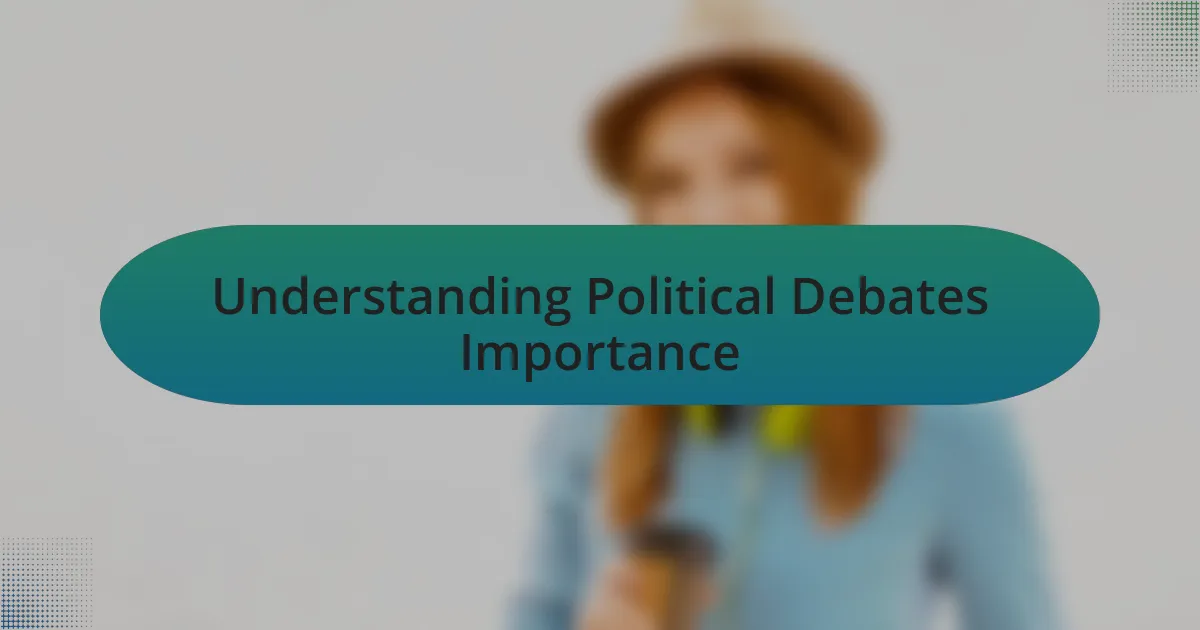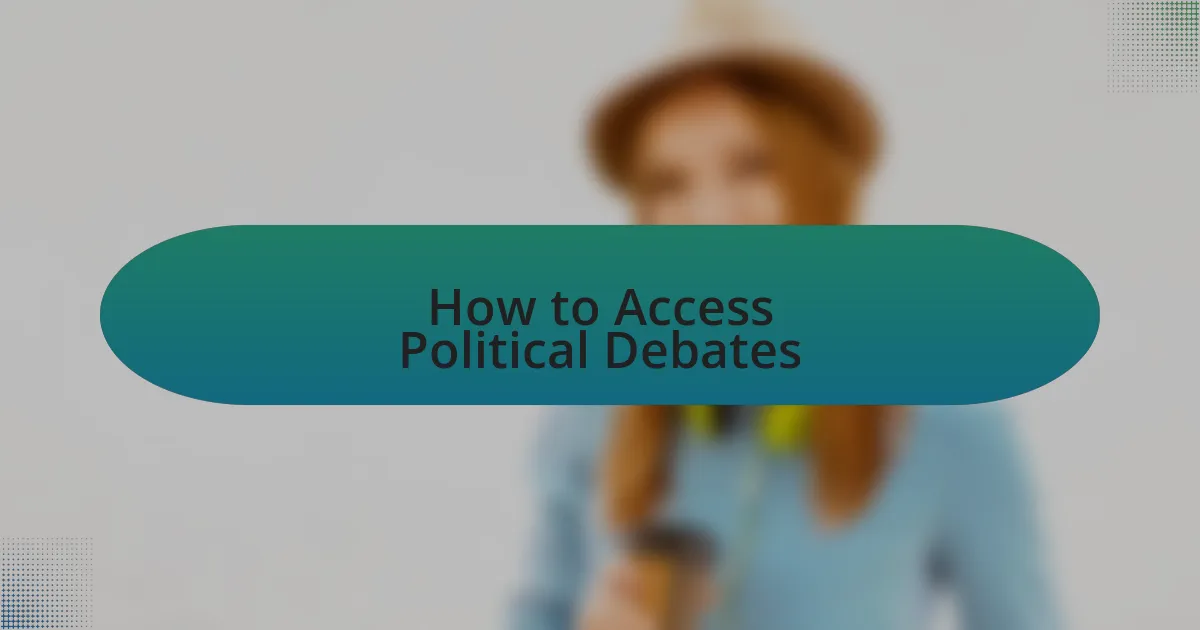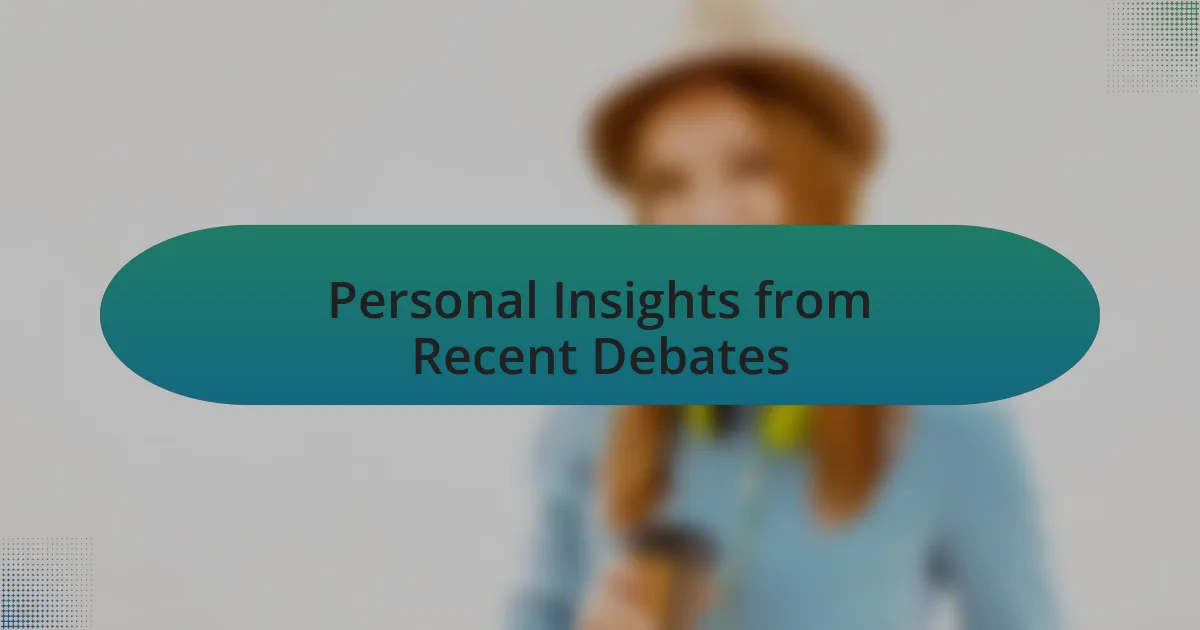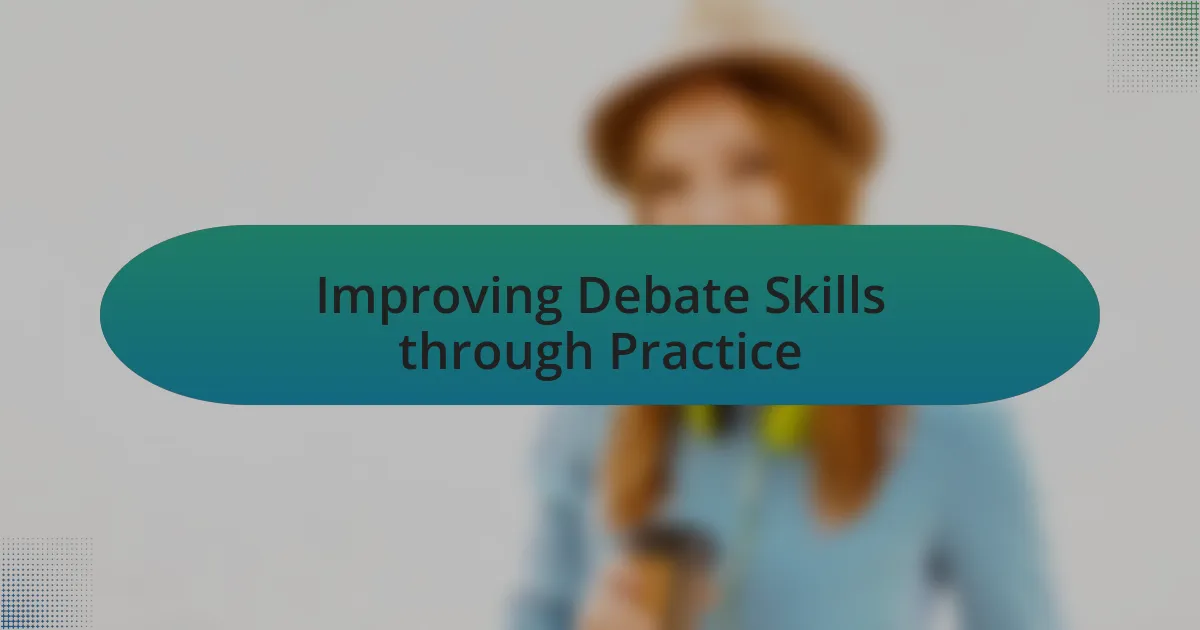Key takeaways:
- Political debates are essential for candidates to communicate their views, inform voters, and foster civic engagement.
- Audio news aggregators enhance understanding of debates by offering diverse perspectives and facilitating community discussions.
- Access to debates has improved through technology, allowing individuals to engage with political discourse at their own pace.
- Practicing debate skills enhances clarity, adaptability, and confidence, making individuals more effective communicators in political discussions.

Understanding Political Debates Importance
Political debates serve as a crucial platform for candidates to present their views and policies, allowing voters to assess their alignment with these ideas. I remember watching a particularly heated debate during a pivotal election cycle and realizing how these moments can crystallize a candidate’s stance in the minds of the electorate. How often do we get the chance to see candidates grapple with tough questions in real-time?
These forums not only inform the public but also foster civic engagement. I once attended a community event where local candidates debated, and the atmosphere was electrifying. The excitement underscored the importance of these debates in sparking discussions that extend beyond the televised screen and into our local coffee shops and living rooms.
Moreover, debates unveil the dynamics of political strategy and rhetoric. I often find myself analyzing body language and word choice alongside what’s actually being said. This layer of communication can reveal much about a candidate’s authenticity and leadership style—traits that are often hard to assess through standard campaign advertisements. Isn’t it fascinating how a single debate can shape not just opinions, but also the entire course of an election?

Role of Audio News Aggregators
Audio news aggregators play a vital role in today’s media landscape by curating diverse perspectives on political debates. I’m often impressed by how these platforms compile not only mainstream opinions but also alternative viewpoints, offering listeners a well-rounded understanding of the issues at hand. It’s like having a front-row seat to the conversation without being in the room.
Listening to various interpretations of debate performances through these aggregators has deepened my appreciation for the nuances in political discourse. I remember hearing a podcast that dissected a debate, highlighting moments that I completely missed during the live broadcast. This analysis taught me that there’s always more beneath the surface, making me wonder how many subtle dynamics shape public perception.
Furthermore, these audio platforms facilitate discussions that might otherwise be overlooked in traditional media. I once found a niche audio segment where everyday citizens shared their reactions to a political debate, and it opened my eyes to grassroots sentiments that often get lost in the echo chamber of large networks. Isn’t it incredible how audio news aggregators not only inform but also connect us to a broader community of listeners, making political discussions more accessible?

How to Access Political Debates
Accessing political debates has become easier than ever with the rise of audio news aggregators. For instance, I often turn to dedicated sections on popular apps where debates are archived. It’s fascinating how a simple search can lead me to various platforms hosting live recordings and summaries, allowing me to catch up and engage at my own pace.
I remember one evening when I was curious about the latest debate. I opened my audio news aggregator app and was pleasantly surprised to find a playlist featuring not just the candidates’ speeches but also expert analyses and listener reactions. This feature prompted me to reflect on how different voices can shape our understanding of political discourse. Have you ever wondered how a single statement from a debate can be interpreted in so many ways? These platforms let me explore that question firsthand.
Moreover, many of these aggregators offer notifications for upcoming debates and discussions. I once set alerts for a series of town halls leading up to an election, which ensured I never missed out on critical conversations. The thrill of receiving that notification and diving into a live broadcast reminded me that engaging in politics doesn’t have to feel overwhelming; it can actually be quite invigorating. How do you access and stay updated on what’s happening in the political sphere?

Personal Insights from Recent Debates
Listening to recent political debates has opened my eyes to the nuances that often get lost in headline news. There was a particular moment in one debate where a candidate passionately addressed an issue that mattered deeply to me. Hearing that emotional plea made me think about how vital it is to connect personal experiences with broader political topics. Have you ever felt that spark of recognition during a debate that made you feel your concerns were truly being heard?
Another aspect that struck me was the contrasting styles of communication among the candidates. I recall vividly a debate where one candidate used humor to diffuse tension, while another took a more stern approach. This made me realize how effective delivery can change the interpretation of a message. It’s intriguing to consider how our own biases influence how we perceive those delivery styles. When watching or listening to debates, do you find yourself aligning with certain styles over others?
I’ve also become more aware of how often the bigger issues are overshadowed by personal jabs or attack lines. During one heated exchange, I couldn’t help but feel frustrated as the focus shifted away from policy details. This left me wondering how many viewers might leave the debate with a skewed understanding of the real issues at stake. How do we ensure that constructive conversations take precedence in political discourse? Engaging with this content has truly deepened my understanding of the need for clarity and respect in political discussions.

Improving Debate Skills through Practice
Practicing debate skills can be as transformative as the debates themselves. I remember joining a local debate club where I faced off against peers on various issues. Each challenge taught me something new—not just about the topics at hand, but about articulating my thoughts clearly under pressure. Do you think those who practice regularly feel more prepared than those who don’t? From my experience, the answer is a resounding yes.
Rehearsing arguments and counterarguments is vital to developing a more robust debating style. I can still recall a day when my coach emphasized the importance of anticipating opposing viewpoints. I never truly understood the power of this approach until I found myself in a debate where an opponent countered my point precisely as I had feared. It was a wake-up call that underscored how crucial it is to think several steps ahead. How often do we engage in conversations without preparing for opposing opinions?
Moreover, engaging in practice debates allowed me to become comfortable with uncertainty and spontaneity. There were moments when unexpected questions took me by surprise, yet each time, I learned to pivot and adapt. I discovered that the ability to think on my feet not only bolstered my confidence but also made the discussions more dynamic. Isn’t it fascinating how practice can make us resilient in the face of unpredictability?